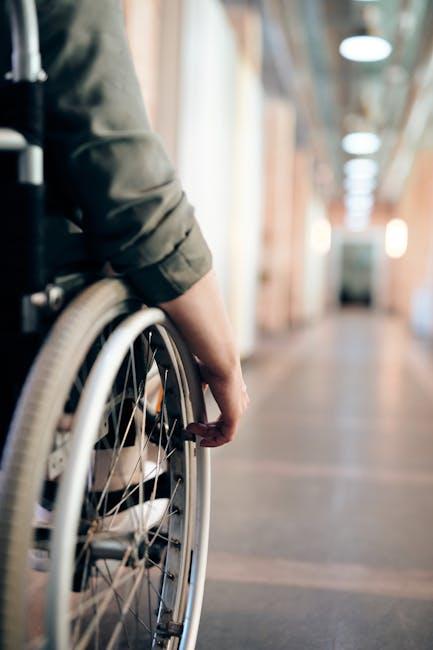In a world that often measures success by self-sufficiency, the pursuit of independence for individuals with disabilities emerges as both a personal and societal journey. “” delves into this intricate dance, where empowerment meets empathy, and autonomy finds its rhythm alongside assistance. This article explores the evolving landscape of disability support, where innovation, policy, and personal narratives intersect to redefine what it means to live independently. Through a tapestry of stories and insights, we unravel the complexities of fostering independence while ensuring that the necessary support structures are not only present but empowering. Join us as we navigate this delicate balance, shedding light on the challenges and triumphs that shape the quest for autonomy in the lives of those who navigate the world differently.
Empowering Choice: Navigating Independence for Disabled Individuals
Finding the right balance between providing necessary support and fostering independence for disabled individuals is both an art and a science. It’s crucial to recognize that independence doesn’t always mean doing everything alone; rather, it involves having the autonomy to make choices about one’s own life. This can include deciding when and how to seek assistance, whether it’s through adaptive technologies, personal aides, or community resources. Empowering choice means respecting these decisions and understanding that support should enhance, not overshadow, personal agency.
Key elements to consider when supporting independence include:
- Customized Assistance: Tailoring support services to fit individual needs and preferences.
- Accessible Environments: Ensuring that physical and digital spaces are navigable and usable by everyone.
- Community Engagement: Encouraging participation in social, educational, and vocational activities.
- Technological Integration: Utilizing assistive technologies to bridge gaps in capability and access.
Ultimately, the goal is to create a landscape where individuals can thrive, make informed decisions, and live with dignity and respect.

Cultivating Confidence: Tools and Resources for Self-Sufficiency
In the journey towards self-sufficiency, it’s crucial to equip oneself with the right tools and resources that foster confidence. Adaptive technology plays a significant role, offering tailored solutions that cater to individual needs. From voice-activated software to advanced mobility aids, these innovations enhance accessibility and independence. Community support networks are another invaluable resource, providing a platform for sharing experiences and advice. They encourage a sense of belonging and empowerment through peer connections.
- Online Learning Platforms: Websites like Coursera and Khan Academy offer free courses to enhance skills and knowledge.
- Assistive Devices: Explore options such as screen readers, smart home devices, and ergonomic tools designed to simplify daily tasks.
- Self-Advocacy Groups: Join forums and organizations that focus on disability rights and self-advocacy to stay informed and engaged.
By leveraging these resources, individuals can build a robust foundation for independence, ensuring that support serves as a stepping stone rather than a crutch. The balance between assistance and autonomy is key to cultivating a confident, self-reliant lifestyle.

Community and Connection: Building Supportive Networks
In a world striving for inclusivity, the delicate balance between fostering independence and providing necessary support for disabled individuals remains a nuanced challenge. Creating a community that both respects autonomy and offers a network of reliable support requires thoughtful action and understanding. Empowerment should not be mistaken for isolation; instead, it is about cultivating an environment where individuals feel both self-reliant and backed by a strong, supportive community. This means establishing spaces where people can freely express their needs and receive assistance without compromising their independence.
To build such networks, consider implementing the following strategies:
- Inclusive Platforms: Develop and promote platforms that encourage dialogue and resource-sharing among disabled individuals and allies.
- Skill-Building Workshops: Organize workshops that focus on enhancing skills, from daily living activities to professional development, tailored to varying needs and abilities.
- Peer Support Groups: Facilitate peer-led support groups that offer a safe space for sharing experiences, advice, and emotional support.
- Accessible Technology: Leverage technology to create more accessible communication channels and resources, ensuring everyone can connect easily.
By prioritizing these elements, communities can effectively balance support and independence, allowing everyone to thrive in an interconnected world.

Innovative Solutions: Bridging Gaps in Accessibility
Empowering individuals with disabilities involves a delicate balance between providing necessary support and fostering independence. Innovative solutions are emerging that bridge the gap between these two essential elements, ensuring that accessibility does not come at the cost of autonomy. By integrating cutting-edge technology with thoughtful design, we can create environments that adapt to the needs of all users, promoting a sense of independence while maintaining accessibility.
- Smart Home Technology: Voice-activated systems and automated devices that allow users to control their environment without physical interaction.
- Adaptive Mobility Aids: Devices like motorized wheelchairs with AI navigation that provide freedom of movement without constant assistance.
- Wearable Tech: Smart wearables that offer real-time health monitoring and emergency alerts, giving users peace of mind while living independently.
- Inclusive Design: Architecture and urban planning that consider accessibility from the ground up, making public spaces naturally accommodating.
By embracing these innovations, we can ensure that support for individuals with disabilities is not a limiting factor but rather a launchpad for greater independence and self-sufficiency.






























